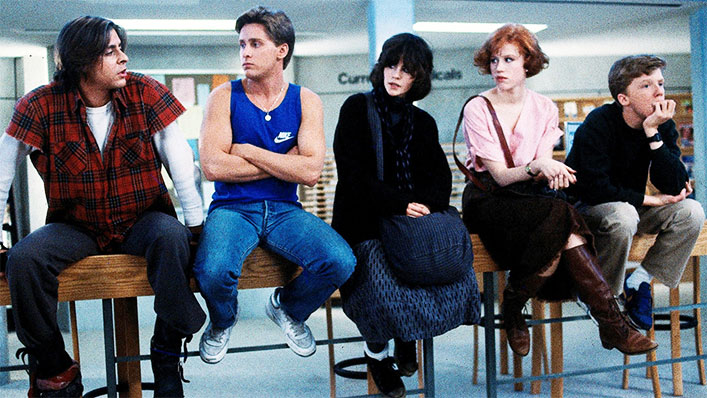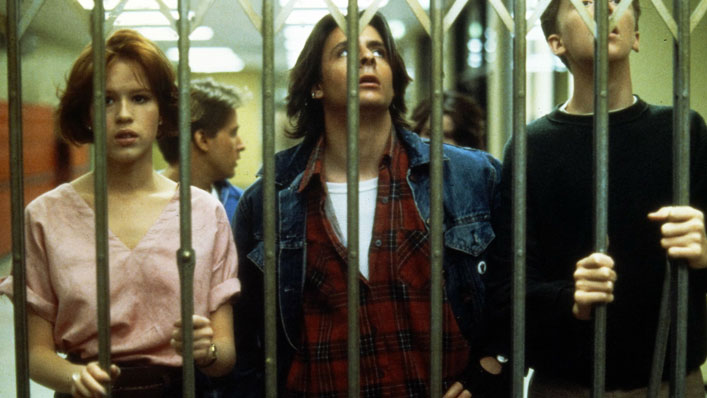4 reasons why The Breakfast Club is a timeless teen classic

John Hughes’ classic high school movie The Breakfast Club turns 35 this year. Critic Sarah Ward revisits the film and lists four reasons why it remains one of cinema’s best portraits of the teenage experience.
It starts with a David Bowie quote, from Changes, about teenage self-awareness in the face of constant judgement. It ends with a defiant, rousing fist-pump that has become one of cinema’s most iconic, oft-emulated images. In-between, it charts a day-long Saturday detention session at Shermer High School, where five students are resigned to spending nine hours in the library together as punishment for their classroom transgressions.
The film is, of course, The Breakfast Club. Thirty-five years after it first introduced the world to a motley crew of angst-riddled adolescents and their one revelatory day, writer/director John Hughes’ seminal coming-of-age movie remains one of cinema’s defining portraits of the teenage experience. There are several reasons why.
1. The story setup us simple but effective
The Breakfast Club’s setup couldn’t be more simple: a quintet of seemingly dissimilar students, all representing different cliques and factions within the school, are forced to come together over the course of their detention. They have common enemies: authority figures in general; parents who don’t care enough (or in the right ways); and the strict authoritarian Assistant Principal Vernon (Paul Gleason). He is overseeing their punishment – which, combined with their shared circumstances, slowly but surely bands them together.
At 7am, the teens see themselves in distinctive roles: a brain (Brian Johnson, played by Anthony Michael Hall), an athlete (Emilio Estevez as Andrew Clark), a princess (Molly Ringwald’s Claire Standish), a criminal (John Bender, played by Judd Nelson) and a basket case (Ally Sheedy’s Allison Reynolds).
That’s how the world sees them too, a fact they’ve been taught from birth to accept. But come 4pm, after talking and fighting and dancing, trying to elude Vernon’s attention, running around the school and spilling their secrets, the self-dubbed ‘Breakfast Club’ could never view themselves so simplistically again.
2. The Breakfast Club rejects how high school usually works
From awareness comes understanding. That’s The Breakfast Club’s thesis, or one of them. After Brian, Andrew, Claire, Bender and Allison actually spend time getting to know each other, realising their commonalities and discussing their similar problems, arbitrary external labels fall by the wayside. The Breakfast Club is a rebuke of snap judgements, instant categorisations, stereotypes, preconceived notions and dismissing others based on only the most obvious information.
In other words, it’s a rejection of how high school and the broader world usually works. Across 97 minutes of teen antics, it’s a rebel yell, too, daring its characters and its audience to overcome the status quo to think and feel for themselves.
Trapped in the library together, far from enthused about their task for the day – an essay describing who they each think they are, to be completed in silence – and looking for any possible distraction, it doesn’t take much to nudge the studious Brian, jock Andrew, snobbish Claire, already rebellious Bender, or the eccentric and eclectic Allison into action.
Talking when he’s not supposed to, antagonising both Vernon and his fellow detention attendees, and splashing his outsider bravado about, Bender is the catalyst; however he’s really just an overt manifestation of the defiance rumbling way inside each of them. He barely needs to push the initially disgusted Claire, wary Brian or protective Andrew to join in his mutiny, or the already-game Allison either. They mightn’t know it to begin with, but they’re all yearning for the chance to do something other than sit dutifully and be punished for being who they are.

3. It embraces difference while recognising universality
That’s the genius of Hughes’ film: its embrace of difference and, simultaneously, its recognition of universality. When Brian eventually writes the prescribed essay on behalf of the group, he tells Vernon that “each one of us is a brain, an athlete, a basket case, a princess, and a criminal” – a sentiment that the movie spends its preceding running time making plain.
These kids are all unique, but they’re also all linked by similar issues, troubles and experiences. And while the school’s most popular girl mightn’t seem to have much in common with the class high-achiever, they both know what it’s like to be pigeonholed and pressured. In their own ways, so does the wrestler pushed to perfection by his dad, the mischief-maker only ever expected to fit one type, and the outcast pushed to the peripheries because she’s considered too weird.
In making this point, casting assists The Breakfast Club immensely; without Nelson’s glowering yet still vulnerable stare, the fragility evident in Ringwald’s conceitedness, and Sheedy’s constantly fascinating presence — even though Allison doesn’t speak for the feature’s first third – their shared malaise and simmering depths wouldn’t have shone through so strongly.
4. It is layered and thoughtful
But like most of his oeuvre, it’s Hughes that’s the guiding force here. The late, great filmmaker hasn’t become synonymous with layered and thoughtful teen comedies without good reason.
Hughes had added just one previous film to the genre when he took cinemagoers to Shermer High in 1985. Also starring Hall and Ringwald, Sixteen Candles was a hit and remains an adored classic. However there’s no doubting that, with The Breakfast Club, Hughes dialled up the insight by not only presenting a comic portrait of teenage angst, but by probing and pondering just why his teen characters – and teens in general – were so angsty at an existential level.
Hughes continued to do so afterwards, exploring both the woes and joys of adolescence in his other standout addition to the fold, Ferris Bueller’s Day Off. It’s a fitting kindred spirit to – and, more than three decades later, often mentioned in the same breath.
The reason the two endure is, fittingly, awareness and understanding. Hughes knows what makes teens struggle, suffer, spend all day in bed, never speak to their classmates and hide behind easy labels. His his movies know what makes them rebel, skip out on both detention and school as well, sing in a parade float and pump their fists as well.

















